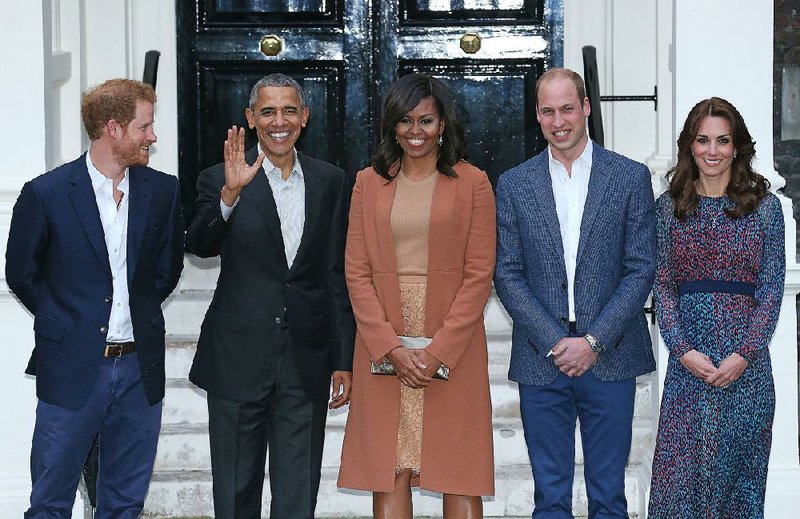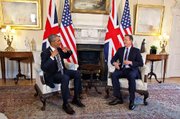LONDON -- President Barack Obama made a forceful plea Friday for Britons to heed Prime Minister David Cameron's call to stay in the European Union and dismissed critics who accused the U.S. president of meddling in British affairs.
Standing aside Cameron at a news conference at No. 10 Downing St., Obama said the United Kingdom's power is amplified by its membership in the 28-nation union, not diminished. He delivered an almost sentimental appeal to the "special relationship" between the two countries and cast a grim picture of the economic stakes -- saying flatly the U.S. would not rush to write a free-trade deal with the U.K. if it voted to exit.
"Let me be clear, ultimately, this is something the British voters have to decide for themselves. But as part of our special relationship, part of being friends, is to be honest and to let you know what I think," Obama said. "And speaking honestly, the outcome of that decision is a matter of deep interest to the United States, because it affects our prospects as well. The United States wants a strong United Kingdom as a partner, and the United Kingdom is at its best when it's helping to lead a strong Europe."
Obama spoke on the first day of a three-day visit to London. Coming two months before a June referendum on leaving the union, Obama plunged himself into heated debate about the U.K.'s national identity, immigration policy, economic fairness and the trust in institutions.
Although, he couched his views as "my opinion," Obama accused his critics of being "afraid to hear an argument being made."
In 2014, Obama was far more restrained during the U.K. referendum on Scottish independence. He delicately expressed his view in favor of unity months before the vote. And when the race tightened, he weighed in from afar -- with a tweet.
On Friday, Obama echoed several of the arguments Cameron and other stay-in-EU advocates have been making for weeks -- with an added a punch only Obama could deliver. He noted some have suggested that if the U.K. exited the European Union, the U.S. and the U.K. would quickly arrange a bilateral free-trade deal to soften the blow to British businesses. Obama said the U.S. is focused on negotiating the Transatlantic Trade and Investment Partnership with the EU.
A U.S.-U.K. trade deal might happen someday, but "it's not going to happen anytime soon," he said, adding the U.K. would have to get "in the back of the queue."
"Right now, I've got access to a massive market, where I sell 44 percent of my exports," Obama said. "And now, I'm thinking about leaving the organization that gives me access to that market, and that is responsible for millions of jobs in my country and responsible for an enormous amount of commerce and upon which a lot of businesses depend, that is not something I would probably do."
Justice Minister Dominic Raab, a leader of the exit campaign, said Britons shouldn't put stock in Obama's view.
"He argued that he thinks it is in America's interests for the U.K. to stay in the E.U. but what is good for U.S. politicians is not necessarily good for the British people," Raab said in a statement.
London Mayor Boris Johnson, a leader for the side favoring the U.K.'s exit, said Obama's advice was "paradoxical, inconsistent, incoherent" because Americans "would never contemplate anything like the EU for themselves."
Writing in The Sun newspaper, Johnson recounted a claim that a bust of former British Prime Minister Winston Churchill was removed from the Oval Office after Obama was elected and returned to the British Embassy.
Johnson wrote that some said removing the bust "was a symbol of the part-Kenyan president's ancestral dislike of the British Empire, of which Churchill had been such a fervent defender."
Obama's late father was from Kenya, a former British colony that gained independence in the 1960s.
Obama did not respond directly to the remarks about his ancestry. But he did mention the Churchill bust, saying the Oval Office had limited space and, as the first black U.S. president, he thought it was important to have a bust of Martin Luther King Jr. in the room.
He said the Churchill bust remained in a prominent White House location outside his private office "so that I see it every day -- including on weekends when I'm going into that office to watch a basketball game."
"I love Winston Churchill," Obama said. "I love the guy."
Johnson said later that he was "a big fan of Barack Obama" and had not been trying to suggest the president was anti-British.
Obama's trip had a dual purpose. Along with backing up Cameron, Obama paid his respects -- and one last social call as president -- to Queen Elizabeth II for her 90th birthday.
Obama and his wife, Michelle, were greeted by the queen and her husband, Prince Philip, after the presidential helicopter landed at Windsor Castle.
The Obamas' gift for the queen, who wore a periwinkle-colored outfit and a white scarf, was a photo album of her meetings with U.S. presidents and first ladies. The queen's first visit to the U.S. was in 1951, as Her Royal Highness Princess Elizabeth, when she met with President Harry Truman, according to the White House.
The queen has been on the throne since 1952 and has met 11 presidents, according to Buckingham Palace. Obama has met with her twice before, in 2009 and 2011.
Information for this article was contributed by Kathleen Hennessey, Jill Lawless and Darlene Superville of The Associated Press and by Toluse Olorunnipa and Justin Sink of Bloomberg News.
A Section on 04/23/2016

